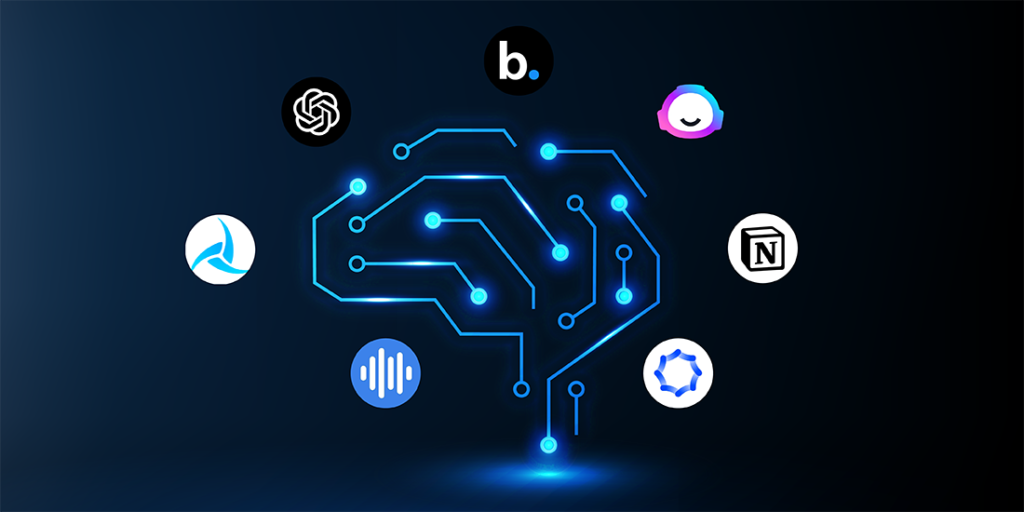Who’s ready to upgrade their digital marketing strategies?
Today, I want to introduce something that is revolutionizing the way we do business online: artificial intelligence, or simply AI.
I’ll show you in a very straightforward way how you can implement AI practically into your digital marketing strategy.
If you’ve heard about artificial intelligence, you know it’s one of those technologies that seems like something out of a science fiction movie, right? But the truth is, it’s becoming increasingly present in our daily lives, and the world of marketing is no exception. AI can be a powerful ally for better understanding your audience, personalizing your campaigns, optimizing processes, and much more.
So, if you’re ready to explore the full potential of artificial intelligence and take your digital marketing strategy to the next level, keep reading. 😊
1) Define your goals

Setting clear objectives is the essential starting point when implementing artificial intelligence into your digital marketing strategy. Before diving headfirst into AI, it’s crucial to identify which specific goals you want to achieve. This may include improving the personalization of customer communications, enhancing customer service, optimizing ad targeting to reach the right audience, or even increasing operational efficiency, especially if your company is a SaaS and has acquisition and PQLs or MQLs generation as KPIs.
For example, if your goal is to enhance your brand’s personalization, you can use AI to analyze user behavior data and create more relevant and personalized experiences. If the focus is on customer service, AI can be implemented to automate responses to frequently asked questions, provide instant support through chatbots, or even predict customer needs based on their past interactions.
By defining clear objectives, you can direct your AI implementation efforts more effectively, ensuring that each initiative is aligned with the desired outcomes. This not only helps maximize the return on investment in AI but also facilitates the measurement of success and the adjustment of strategies as needed over time.
Here are some suggestions for using AI for your business:
- Increasing conversion rate: Utilize AI to analyze user behavior data and identify patterns that lead to conversion. With this information, you can personalize offers, product recommendations, or messages to increase the conversion rate on your website or app. Focus on the PQL that I mentioned above.
- Reducing customer churn: Implement AI to identify early warning signs of customers at risk of cancellation and take proactive measures to retain them. This may involve using predictive models to anticipate churn and trigger personalized re-engagement campaigns.
- Improving content marketing effectiveness: Use AI to analyze large volumes of data and identify topics, formats, and content channels most effective for your audience. This can include using natural language processing algorithms to understand user preferences and recommend relevant content.
- Optimizing return on advertising investment: Implement AI to target ads more accurately based on user behavior and demographic characteristics. Additionally, you can use machine learning algorithms to automatically optimize ad bids and allocate budgets more efficiently.
- Automating repetitive processes: Implement AI to automate manual and repetitive tasks such as lead scoring, report generation, and data analysis. This frees up time for your team to focus on higher-value activities such as strategy and creativity.
2) Choose the right AI tools

Choosing the right AI tools is crucial for the success of your digital marketing strategy. With the advancement of technology, there is a variety of AI-powered tools available for different aspects of marketing, each offering specific functionalities to meet your business needs.
When selecting the right AI tools for your digital marketing strategy, it’s important to consider your goals and budget. Carefully evaluate the features and functionalities of each tool, as well as the costs associated with its implementation and maintenance. Additionally, look for reliable and experienced vendors in the artificial intelligence market who can provide technical support and training for your team. By making an informed choice, you’ll be better prepared to harness the full potential of AI in your digital marketing strategy.
Here are some examples of commonly used AI tools today:
- ChatGPT — Solves everything. Seriously.
- Writesonic — For copywriters and writers in general.
- Replit — For developers and programmers, an excellent tool for writing code.
- Midjourney — Perhaps the most well-known among marketers. The perfect tool for creating graphics and images.
- Remini — For photo editing, very similar to Adobe Photoshop’s AI, but it’s free and easier to edit for non-editors.
- Synthesia — And for creating videos, this is the right tool.
- Pictory — After creating videos, b-rolls, etc., this is the tool to edit them easily and conveniently.
- Murf — For voiceovers in all possible languages. Great for YouTube channels.
- Minvo — To edit your long videos into cut formats for Reels and TikTok. A time saver indeed.
- Soundraw — To create music, yes, there are AIs for that too.
- Slides IA — For that beautiful, modern, and quick-to-create presentation.
3) Start small and scale gradually
Starting small and scaling gradually is a smart approach when implementing artificial intelligence (AI) in your digital marketing strategy.
By beginning with pilot projects or small-scale implementations, you can reduce the financial and operational risk associated with adopting new technologies. This allows you to test AI tools in a controlled environment before making a more significant investment.
Furthermore, most of the AIs I mentioned above have their free versions, which often deliver everything you need at that moment.
This allows you and your team to learn about the capabilities and limitations of AI and make adjustments as needed. This includes enhancing algorithms, refining models, and developing best practices for integrating AI into your marketing strategy.
Another important factor to consider when starting small is that, by seeing positive results from initial pilot projects, you can build confidence both within your team and with company stakeholders. This can help ensure ongoing support and funding to expand and integrate AI into different areas of your marketing strategy.
Once you have established the effectiveness of AI in your marketing efforts, you can gradually expand its adoption and integration throughout the organization. This allows you to leverage the benefits of AI on a larger scale and in different areas, such as personalization, automation, and data analysis.
4) Focus on personalization
Focusing on personalization is a powerful strategy for engaging and converting your target audience, and artificial intelligence can play a key role in this process.
Utilize AI algorithms to analyze individual customer data, including purchase history, browsing behavior, social media interactions, and more. This detailed analysis allows you to understand the unique preferences and interests of each customer.
Furthermore, based on the analysis of individual data, use AI to generate personalized recommendations for products, content, or services that are most relevant to each customer. This can be done on your website, in marketing emails, in your brand’s content production, in rich materials, in targeted ads, and in other digital interactions.
It’s also beneficial to use AI to segment your audience into more granular groups based on demographic, behavioral, and preference characteristics. This allows you to create highly targeted and focused marketing campaigns that resonate with each specific group of customers.
And of course, perhaps the most automated of processes is in the area of customer service. Creating personalized communications that are relevant and impactful for each customer, including not only the content of the text but also the tone, style, and format of the communication, tailored to each customer’s preferences, is undoubtedly one of the best ways to efficiently utilize AI for marketing today.
But we’ll talk about customer service later on.
5) Optimize ad campaigns

Imagine you’re managing a paid campaign to promote your company’s new product. You want to reach your target audience with relevant and compelling messages, and that’s where artificial intelligence comes in. With AI for programmatic advertising, for example, Google Ads or Meta Ads, you can automate the entire process of ad placement, bidding, and targeting. This means you can target your ads to the right people, at the right time, and in the right place, without spending hours manually adjusting every detail of the campaign.
Furthermore, with AI, ad platforms can analyze real-time data, such as click history, conversion rates, and user behavior, to automatically adjust your bid bids in each ad auction. This ensures you’re getting the best return on investment (ROI) possible, making the most of every penny of your advertising budget.
Let’s say this new product from your company is a new clothing line/collection. With AI, you can target your ads based on demographic data, such as age, gender, and location, but also on specific interests and behaviors related to beauty, such as lifestyle channels on YouTube, or following beauty influencers on Instagram. So far so good, the “basics” of an ad manager.
However, nowadays with AI, you can do more than that. You can create Messenger / Direct campaigns on Instagram with automated messages and responses that will “cut corners” for the lead to make a purchase. And all of this automatically, self-service.
In Google Ads search campaigns, for example, you can already link ads to your brand’s WhatsApp, and on WhatsApp, automate conversations to answer your customer’s questions and close the sale right there.
Not to mention Google’s new Performance Max Campaign, where the platform itself will choose the best ad format to deliver to your target audience.
All automated and personalized in the best possible way, to impact your audience at the right time with the right message.
It’s definitely worth a try.
6) Implement chatbots for customer support

As I mentioned above, customer support chatbots, in my opinion, are what have most transformed the way companies use AI, as it is greatly facilitating the customer service sector to personalize, automate, and deliver an above-average experience for their customers.
Imagine a marketing manager of an e-commerce company that sells clothes online (yes, the same example as above hehe). Your customers have questions about sizes, available colors, delivery times, and return policies. Normally, these questions would be handled through emails or phone calls, which can consume time and resources from your customer support team. However, with the implementation of AI-powered chatbots on your website, you can offer instant support and assistance to your customers, 24 hours a day, 7 days a week.
In practice, I have seen the following happen: a customer accesses your website in search of a winter jacket. They have questions about the size and whether the jacket is waterproof. Instead of searching for information on various pages of your website or waiting for an email response, the customer is greeted by a friendly chatbot as soon as they enter the site. The chatbot asks the customer about their size preferences and then provides personalized recommendations based on their previous purchase history and customer reviews. Additionally, the chatbot offers detailed information about the waterproofing of the jacket and provides a direct link to the product page where the customer can make the purchase immediately.
But the benefits of chatbots don’t stop there. They can also handle routine inquiries such as order status, payment information updates, and delivery tracking. This frees up your customer support team to deal with more complex and urgent issues, ensuring that your customers receive quick and efficient assistance whenever they need it.
An interesting example is the case of a telecommunications company here in Brazil, which implemented a chatbot in its mobile app to assist customers with technical issues. The chatbot was able to resolve over 70% of customer queries without the need for human intervention, significantly reducing average response time and improving customer satisfaction.
Therefore, implementing AI-powered chatbots for customer support can provide instant, personalized, and efficient assistance to your customers, increasing customer satisfaction, reducing operational costs, and driving the growth of your business.
7) Maintain ethics and transparency

But not everything is permissible to do in any way. It is essential to ensure that all this data is obtained ethically and that customer consent is obtained in accordance with data privacy regulations, such as GDPR in the European Union or LGPD in Brazil, for example. This means being transparent about how the data will be used and offering customers control over their personal information.
Another important issue is transparency in the use of AI. You must be open and honest with your audience about how AI is being used in your marketing strategies. For example, if you are using chatbots to provide customer support, it is important to inform customers that they are interacting with a chatbot and not with a human agent. This avoids any misunderstanding or lack of trust on the part of customers.
By maintaining ethics and transparency in the use of AI in marketing, you build a solid foundation of trust and credibility with your audience. This not only protects the rights and privacy of your customers but also strengthens the relationship with your brand and drives the long-term success of your business.
Conclusion
The implementation of artificial intelligence in your digital marketing strategy can undoubtedly open up a world of opportunities to enhance customer experience, increase operational efficiency, and drive business growth. However, it is crucial to adopt an ethical and transparent approach when using AI, ensuring that the rights and privacy of customers are protected and respected.
By setting clear objectives, choosing the right tools, starting small and gradually scaling up, focusing on personalization, and maintaining ethics and transparency, you can maximize the benefits of AI in your marketing strategies. Remember that AI is a powerful tool, but it is your commitment to integrity and responsibility that will truly make a difference in the success of your marketing initiatives.
With the power of AI by your side, the future of your business marketing is promising and filled with exciting possibilities for growth and continued success.
Now, I want to hear from you. Have you been using any AI in your work? Which ones? And how have these AIs been helping your business?
Feel free to give me feedback and share your stories here with me as well. I’ll be very happy to receive your message.
Don’t forget to subscribe to my newsletter here on Medium to receive exclusive content on performance, paid media, productivity, creativity, marketing as a whole, and some geeky stuff.
Thank you for reading this far. See you next time!




